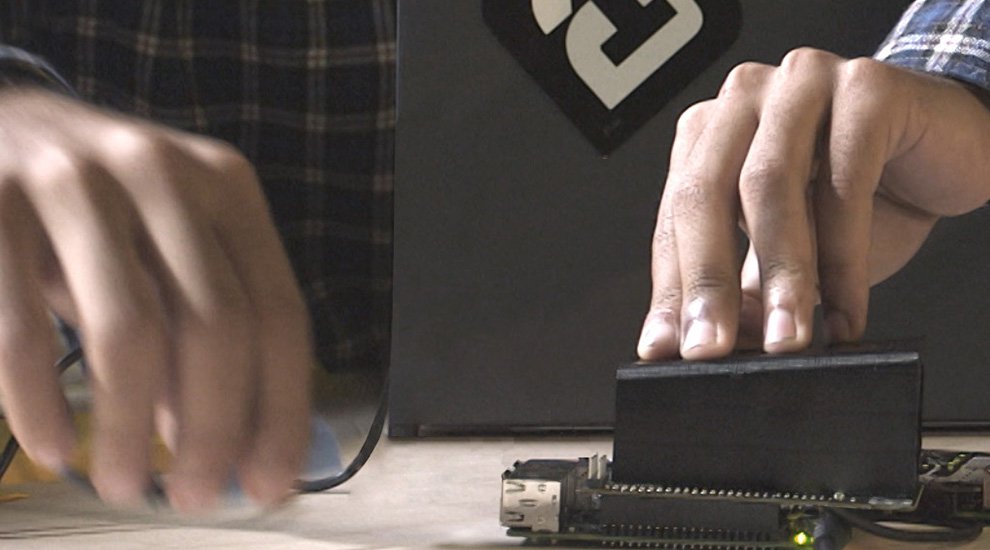21 Bitcoin Community Holds First Hackathon; Develops Bounty Project Git Money
When 21 Inc. introduced its first product, the 21 Bitcoin Computer, it was targeted at developers who could use the company’s hardware and software tools to create applications built on Bitcoin infrastructure. And since the company launched the product in November, there has been a vibrant community in the company’s Slack group, with developers exchanging project ideas and tips.
Hackathons are one of the most common events that developers participate in because it creates an exciting, competitive atmosphere. Last night, for close to nine hours, developers from the 21 Bitcoin community participated in the first ever hackathon.
and we’re off! Join the @21 #Bitcoin Computer Hackathon at https://t.co/LjQqHv4nEU! pic.twitter.com/Y2zR6v8dXn
— Andrew DeSantis (@desantis) January 18, 2016
Boilerplate
Leading up to the hackathon, several of the participating developers offered up a $400 bounty for the first person to build a way to order pizza through the Bitcoin Computer. This challenge was significant because the first recorded purchase with bitcoin was a transaction to buy two pizzas. Ultimately, the team realized that the Dominos APIs were antiquated, so pizza was ordered the old fashioned way.
The hackathon started with the goal of creating a graphical user interface to allow developers to quickly get started with the 21 Bitcoin Computer, also known as a boilerplate.
If you think of it like a starter kit for people that want to make apps on the 21 BTC computer. It’s a really quick way to get up and running to build an app that sort of leverages the 21 libraries and brings up that functionality into a GUI that you can feel and touch,” said Mason Borda, a software engineer at BitGo.
Right now, when a developer wants to use the 21 Bitcoin Computer, he has to use a command line interface. For many, that’s ideal; however, for other developers, having a nice graphical user interface makes it easier to get started.
Bitcoin Trades Power for Privacy
After getting started on some tasks for the graphical user interface, the conversation changed from projects to the philosophy of bitcoin; not as an economic innovation, but a technological one.
Right now, when we visit a website, we are inundated with ads and cookies, resulting in a slower Internet. Bitcoin creates the potential for a user to reclaim their privacy so that they don’t have to be tracked around the Internet.
In the developing world, you will see all kinds of opportunity to open up new commerce and create micropayments for digital services that weren’t previously possible,” said Will Binns, a member of the 21 team.
But it was another developer—who requested to remain anonymous—that focused on how commerce was going to become bidirectional once bitcoin became more widely adopted. Whereas now, users are tracked, in the future, consumers will be able to charge companies for their information. “The companies will ask for information to make the apps stronger and the consumers can demand payment for that,” he predicted.
Git Money Bounties
But all of this discussion ultimately culminated in the creation of a brand new project called Git Money. As the night went on, one of the users brought up the potential of crowdfunding projects. His hope was that people might be able to fund other people’s ideas around the world.
This concept evolved into Git Money, which converts issues on GitHub into payable bounties. A bounty could be anything from a piece of code, to a graphic or an article. Every issue that is created on a GitHub repository could have a bounty associated with it. Utilizing a bitcoin address, anyone from around the web could help crowdfund it if they felt that the issue was important.
Another use case would be a repository owner offering a bounty for a particular issue to be fixed. A company might not have the development resources for a project, so the company could post a bounty on their repository with people sharing their code.
It’s not about where you are from as a developer. It’s about how good your code is. With this system, your code speaks for itself,” said one of the participating developers.
With each pull request submitted to that issue, the contributor would include their bitcoin address. If that request was merged into the project, the bitcoin in the issue address would be transferred to the bitcoin address of the contributor automatically.
Ultimately, the goal of a hackathon is for developers to get together, share ideas, and work on projects. And last night, developers from all over the country and world shared their ideas on projects that could be built over the 21 Bitcoin Computer.
Jacob Cohen Donnelly is a consultant and journalist in the Bitcoin space. He runs a weekly newsletter about bitcoin called Crypto Brief.
The post 21 Bitcoin Community Holds First Hackathon; Develops Bounty Project Git Money appeared first on Bitcoin Magazine.



